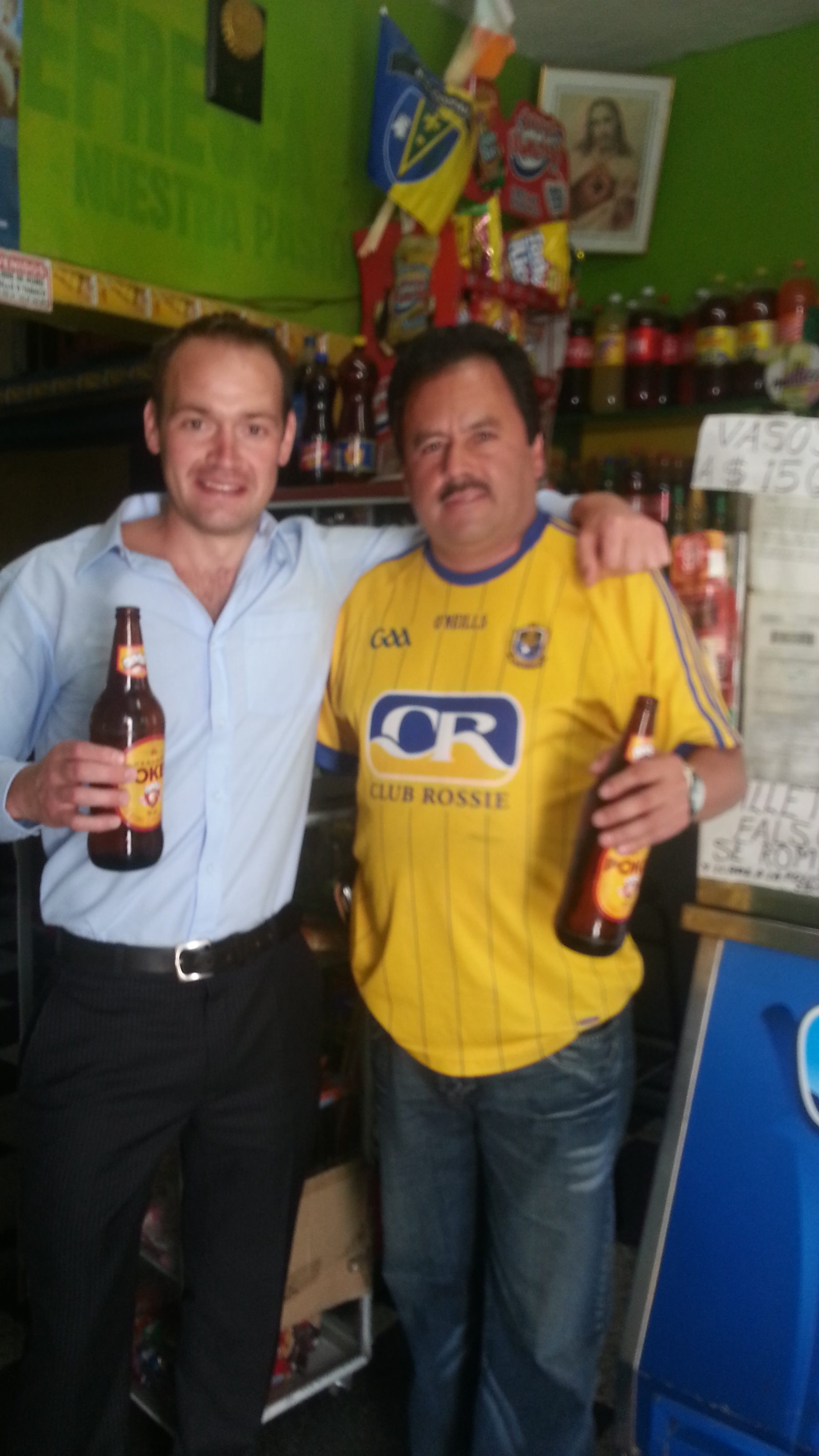
@radiobrendan
We all, those of us with links to the place at least, have our own views about Colombia and what it represents. There are, obviously enough, many ways to look at it.
Nonetheless, however you view it, do remember that it is ‘Colombia’ not ‘Columbia’. For a country with so much to offer and seemingly growing ever more popular by the day, some outsiders still can’t spell it correctly. Hence the line ‘The only ‘u’ that should be in Colombia is you.’ Clever enough stuff, eh?
So as a helping hand in this regard, taking each letter of the country’s name, here we give our — sideways you might say — take on what Colombia is for us.

Changua: It might not be on everybody’s list … (Photo by Jorvato, Wikipedia.)
C is for changua
Admittedly this isn’t the first thing people think of when linking the letter ‘c’ to Colombia. Most would more than likely go for the country’s world-renowned coffee. (No? What were you thinking of then?)
Yet we’re plumping for changua here, not only because we find it delicious, especially in combating a hangover (on the rare occasions we have one), but also because not many outsiders will know about it.
In fact, the changua we love — a couple of cracked eggs cooked in milk with bread, cilantro leaves, a bit of onion and perhaps garlic, ideally some cheese melted in as well, with salt to taste — is pretty much a Bogotá speciality. It’s hard to get that exact mix on offer in other parts of the country.
For most who haven’t tried it, it sounds revolting. We have to admit, we thought the same. But it works, and works wonderfully if you ask us.
O is for office
We’ve had a few ‘offices’ scattered around the capital; they’ve generally depended on where we’ve been living at the time.
Basically, we’re on about ‘our’ panaderías, the bog(otá)-standard bread and coffee shops. Delightful places to get an affordable coffee with milk (a ‘perico’) and snack-sized portions of fresh bread, all the better when they’re just out of the oven. We call them the office as we tend to spend a good deal of time in them, be it to do some writing or other work, or simply just to chill out.
Giovanni’s on Calle 32 just up from Carrera 5 in La Perseverancia (see below) remains a favourite even though we now live miles away from there. Max Pan in Barrio Santandercito and Vicky’s in Barrio Nueva Zelandia are new regulars in our current north Bogotá base.
L is for Lost City (Ciudad Perdida)
Colombia’s Machu Picchu so to put it, but somewhat quainter and allegedly older. It’s now over eight years since we visited this ancient indigenous settlement hidden away (well, not quite now!) in the Sierra Nevada de Santa Marta jungle off the Caribbean coast, yet it left a lasting impression.
Things might have changed a little since then, but we found the three-day trek to reach it more authentic, and certainly far less congested, than the more celebrated Inca ruins. While we’re due a return, there remain other popular and not-so-popular beauty spots that we’ve yet to visit here; ‘a lot seen, a lot more to see’. All in its own good time.
O is for Ordóñez
An important ‘o’ this, insofar as some people put a ‘u’ in here. Don’t. That’s a different place.
So rather than ‘u for Uribe‘ we’ve got ‘o for Ordóñez’, the nation’s former inspector general who’s now a 2018 presidential candidate.
As mentioned in a previous post, in many ways Alejandro Ordóñez represents traditional Colombia, so he’s worthy of inclusion here. That and the fact that of the country’s political big guns he’s one of only a couple we’ve met, briefly as it was.
M is for mujeres
We could have used ‘c’ for chicas, but changua is far more important (and rewarding). So we’ll mention the women, ‘mujeres’ here.
Colombia, of course, is well known for its beautiful women, but that beauty often comes at a price, in all sorts of ways. This is certainly the case for the majority of the ones we’ve tried to ‘woo’ anyway.
We’ve practically written the book on that in a host of previous blog posts (you can start with ‘Ignoring is bliss‘ and work back from there), so we’ll say no more other than try not to take things too seriously if you do get involved on this score. It’s better in the long run.
B is for Bogotá
An obvious one, but it has been the base of our Colombian operation and it’s a city that still exerts a strange hold on us.
When we do eventually leave the place, there are lots of things we’ll miss. They’re just not always easy to put a finger on.
I is for IQuiz «The Bogotá Pub Quiz»
Self-serving this may be, but we’re talking about our experiences in the almost six years we’ve been here, and IQuiz has played a significant part. Put simply, our labour of love.
A is for Abril
No, we’re not referring to the month of April, which is ‘Abril’ in Spanish. We’re on about the surname Abril, and more specifically our good friend Fernando Abril.
For sure Colombia has many amazing and unique things going for it, but as in many walks of life, it’s often the simpler ones that matter most.
In this regard, Fernando, his small tienda and a number of the clientele in the not-quite-salubrious surroundings of La Perseverancia have been a memorable find.
Yes, in other barrios we’ve found similar places, but Fernando’s and the folk of La Perse are the original, the first ‘true love‘ so to put it (with a worthy mention of a bar up Barrio Egipto way, the precursor to La Perse in a sense).
So that’s ‘our Colombia’, one version of it anyway. Each to their own and all that.
___________________________________________________
Facebook: Wrong Way Corrigan – The Blog & IQuiz «The Bogotá Pub Quiz».







[…] the cazuela Paipana is worth a try to kick-start your day. It’s basically a super-charged changua, packed with almojábanas (a rather delicious-when-just-baked type of cheesy bread made from corn […]
Califica:
-
Me
gusta
0
- No me
gusta
0
Reportar[…] over six years based in Bogotá we’ve experienced many aspects of Colombian life, from the hugely enjoyable to the utterly […]
Califica:
-
Me
gusta
0
- No me
gusta
0
ReportarHi Mr. Corrigan,
This is Colombia for me:
C for Caribbean, you’ve been there, you know why.
O for oso de anteojos, beautiful, endangered, and probably unique to my country.
L for limones, original from Asia, but the colombian ones are the best! Lulos work fine too!
O for orquideas, which put Colombia in first position about number of species in the world.
M for mountains, which are beautiful, although punished by greedy humans…
B for belleza, because Colombia is a stunning and beautiful country… in spite of its people destroying it.
I for Isla Malpelo, because it is the home for fabulous hammerhead sharks, which I like a lot!
A for ajiaco, because man, a good ajiaco makes you happy!
And thank you for clarifying that is not Columbia; I get both nasty glances and pissed attitudes when I correct the gringos; when they say columbia. I think they are talking about the university, or one of the Columbia towns in the USA. Gringos don’t like to be corrected…. even if they lack the knowledge, or the say, right manners…
Califica:
-
Me
gusta
0
- No me
gusta
0
ReportarColombia, so many things to so many people!
Califica:
-
Me
gusta
0
- No me
gusta
0
ReportarNice Brendan. Thanks.
Califica:
-
Me
gusta
0
- No me
gusta
0
Reportar